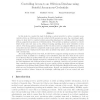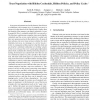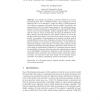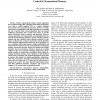211 search results - page 41 / 43 » A Message Recognition Protocol Based on Standard Assumptions |
PKC
2009
Springer
14 years 8 months ago
2009
Springer
In this work, we consider the task of allowing a content provider to enforce complex access control policies on oblivious protocols conducted with anonymous users. As our primary ...
NDSS
2006
IEEE
14 years 1 months ago
2006
IEEE
In an open environment such as the Internet, the decision to collaborate with a stranger (e.g., by granting access to a resource) is often based on the characteristics (rather tha...
CRYPTO
2011
Springer
12 years 7 months ago
2011
Springer
Secure computation enables mutually suspicious parties to compute a joint function of their private inputs while providing strong security guarantees. Amongst other things, even i...
CORR
2010
Springer
13 years 5 months ago
2010
Springer
We consider the problem of intruder deduction in security protocol analysis: that is, deciding whether a given message M can be deduced from a set of messages under the theory of ...
MICRO
2010
IEEE
13 years 2 months ago
2010
IEEE
Today's transactional memory systems implement the two-phase-locking (2PL) algorithm which aborts transactions every time a conflict happens. 2PL is a simple algorithm that pr...




